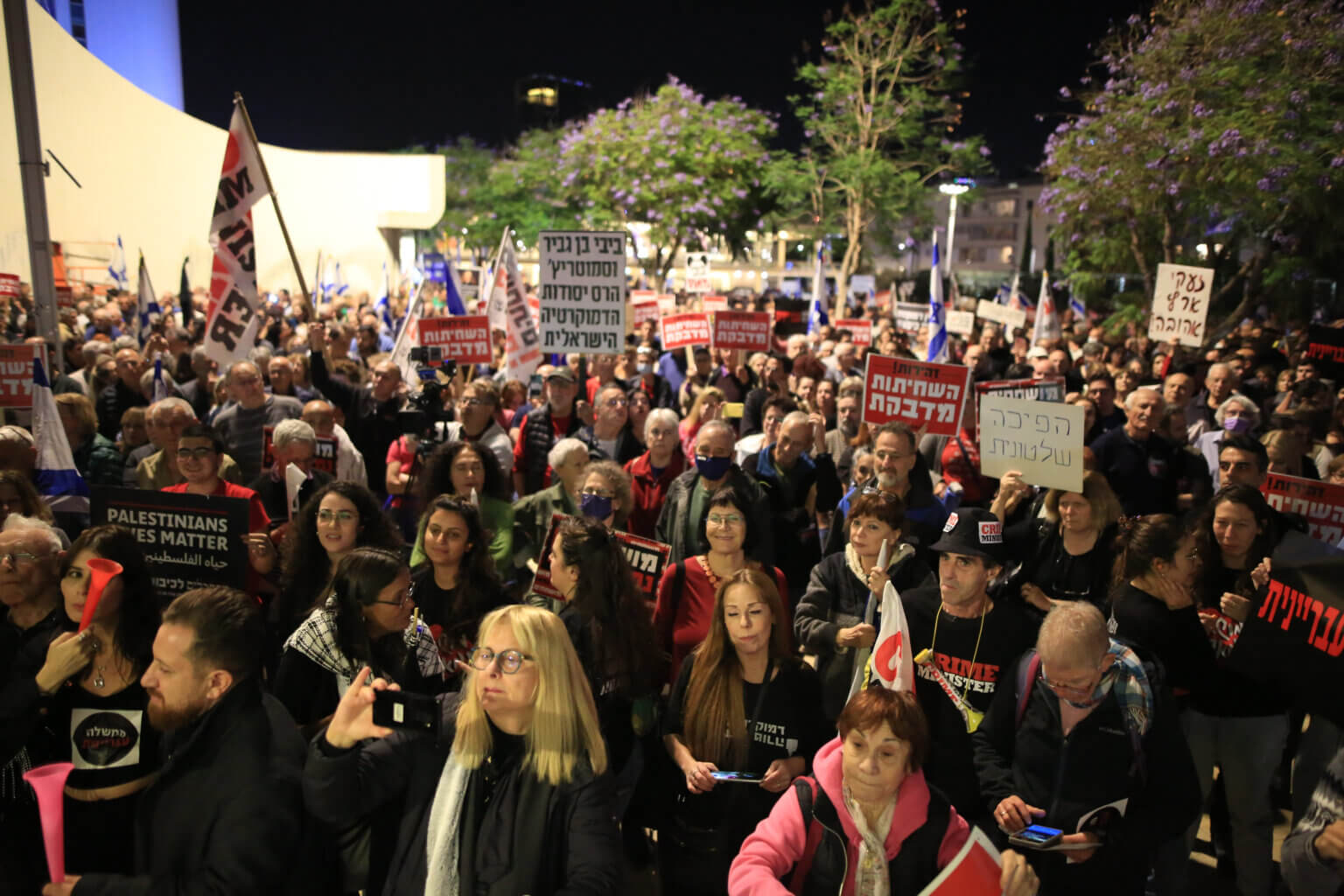The sweeping victory of Israel’s radical right-wing parties in the recent elections, led by the likes of Bezalel Smotrich and Itamar Ben-Gvir, set off alarms across the country and the world, and rightly so. Ben-Gvir and Smortich, who have been enabled and legitimized by Netanyahu for decades, have finally been able to not just contribute to the national agenda of the Israeli government but set it. As a result, 30 Palestinians have been killed by Israeli forces in the occupied territories before the end of January this year, the Palestinian flag has been banned, and attacks against Palestinian citizens of Israel continue to escalate.
Nevertheless, what has worried liberal and so-called “left-wing” Zionists the most is the proposed judicial reforms by Netanyahu and his allies, which will practically declaw Israel’s judiciary. They claim it threatens democracy in Israel. To them I say, “democracy for whom?” Palestinians, both those with Israeli citizenship and those living in the occupied West Bank and Gaza, have always lived under a limited form of democracy, if at all. From the military rule that was imposed on Palestinian citizens of Israel for 20 years to disenfranchisement efforts by the Israeli government in recent years, Palestinian citizens have never been able to freely experience nor participate in “Israeli democracy” like their Jewish counterparts.
The rise of the new government is only accelerating the process of transforming Israel into solely a Jewish state, without its “democratic” character that liberal and “left-wing” Zionists try so desperately to portray. Moreover, ministers within the current government are not hiding their intentions at creating a state that clearly and completely elevates its Jewish population above the rest, with Smotrich, the Minister of Finance, openly declaring he is a fascist.
Smotrich and Ben-Gvir, two deeply ideological figures who want to achieve their twisted political visions at all costs, are plunging Israel down an identity crisis that has been over seven decades in the making: is Israel a democratic and Jewish state? This identity crisis is quickly hurdling towards the Jewish-Israeli and pro-Israel public, and they are not prepared to face it.
However, does Israel really have an identity crisis? Is there — or has there ever truly been — a debate on which aspect of Israel’s “Jewish and democratic” character is more prominent?
The short answer is no.
But the answer also sheds light on one of the key drivers of what we have come to see as the “collapse” of the “left-wing” camp in Israel.
Undoing the democracy charade
One of the factors that made Israel into the powerful military force it is today will also be the undoing of its almost century-long charade of democracy: compulsory military service. Decades of occupation, during which almost every Jewish-Israeli has taken an active part in due to compulsory service, have trickled into the deepest part of the average Israeli’s mind the idea of Israeli national supremacy over the Palestinians.
This is why even the most “left-wing” parties in the Israeli parliament, such as Meretz, ended up voting in favor of a law that “affords Jewish Israeli settlers in the West Bank civil governance, while Palestinians in the same area are governed by military rule.” While they tried justifying their heinous vote by insisting it was to preserve the coalition, decades of occupation have made them so comfortable with the idea of one person having more rights than the other that they are willing to take an active role in perpetuating that system. This is the ideology of an occupier.
The occupation, both its military and ideological aspects, has always pushed Israel down the violent, right-wing path that led us to the state of affairs today as far back as the establishment of the state.
The so-called “socialist” roots of Ben-Gurion’s Mapai (the predecessor to the Labor party of today) were always disregarded when they contradicted the Zionist ideology of the party — that is, the anti-imperialist character of socialism, namely its Marxist base, was thoroughly ignored through the perpetuation of the occupation. The policies of Mapai always advanced the Zionist project through imperialist actions that inherently reinforce the capitalist system in Israel, thus transforming the country from the welfare state of the 50s and 60s into the neoliberal one it is today.
The possibility for uniting oppressed minorities
But why is this all good for the Palestinians? There are multiple answers to this question, but the primary point of analysis lies in understanding why far-right politicians and parties rise to power in the first place. A phrase often attributed to socialist revolutionary Vladimir Lenin is that “fascism is capitalism in decay.” While he died long before the rise of fascism in Europe, his works definitely pointed to the trend of the rise in fascist politics as a result of the crisis in capitalism.
This framework applies to Israel today, as the aggressive march to neoliberalism in Israel has destabilized the lives of many citizens. As such, incitement against Palestinians (both citizens of Israel and otherwise) has proven to be the ideal way for Israeli elites to distract the masses from the true causes of their socio-economic desperation: capitalist exploitation.
As Israeli workers plunge deeper into economic desperation, it presents a critical opportunity for the establishment of class consciousness and solidarity between Israel’s most marginalized groups and Palestinians. Eventually, Ben-Gvir and Smotrich will begin persecuting other ethnic minorities in Israel — the Ethiopian community, Mizrahim (Jews from Arab or Muslim countries), the Russian-speaking community, and more — as the Israeli public will grow tired and numb to the usual incitement against Palestinians.
The rise of Ben-Gvir and Smotrich is a last-ditch attempt by Israeli capitalism to preserve itself: the occupation and economic exploitation of the West Bank are practically complete (for now), Israel’s Arab neighbors are subdued, and there is a growing international movement to withhold funding for Israel. Now that Israel does not have an excuse for increased funding from the West and has almost run out of avenues for economic exploitation of its neighbors, we see a critical opportunity to break the ethnic divisions in Israel thanks to the proletarianization of Israel’s working masses.
It is time for the Palestinian leadership in Israel, namely the Communist Party and Hadash, to begin working with Israel’s other oppressed minority groups to build a broad workers’ movement. It is crucial, however, that the movement is led by the Palestinian minority in Israel, not only because it is the largest minority group, but, more critically, it has the interest and will to bring an end to the occupation, an essential part to ending the crisis of capitalism in Israel.
By Naim Mousa
Shortlink for this post: https://daysofpalestine.ps/?p=35058







